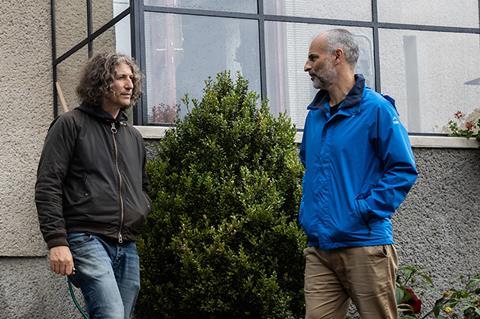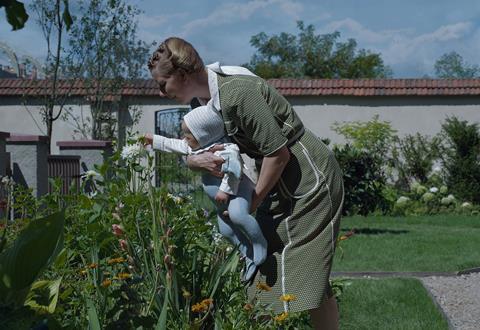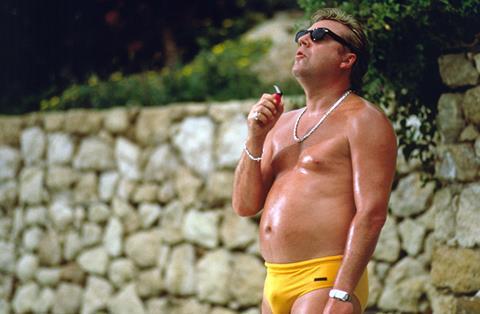Jim Wilson is respected as a creative producer, forging strong links with auteur directors, and led by his own taste. Now a Bafta winner for The Zone Of Interest, he tells Screen about the instincts that drive him.

More than three decades into his film career — first as an executive at Searchlight Pictures and Film4, then as a producer — London-born Jim Wilson has earned his first Oscar nomination. The honour comes for producing Jonathan Glazer’s Holocaust drama The Zone Of Interest, which has earned five US Academy Award nominations including for best picture, as well as three wins at the Bafta Film Awards, including oustanding British film and film not in the English language. It is an outcome the producer-director pair by no means anticipated when they optioned Martin Amis’s novel back in 2014, initially developing it for several years with their own funds.
Wilson calls The Zone Of Interest “without a doubt the hardest thing I’ve ever had to do work-wise” — and it is not hard to imagine that it is challenging to make and finance a German-language film about the Holocaust from the perpetrator perspective, shot in Poland right on the edge of the Auschwitz concentration camp.
In fact, the financing part turned out to be not so tricky, with A24, Film4, the Polish Film Institute and Len Blavatnik’s Access Industries backing the film — the latter partner accessed via Tessa Ross at House Productions. With all Wilson’s past films, which most notably include Lynne Ramsay’s You Were Never Really Here (2017) and Glazer’s Under The Skin (2013), “there’s only ever been one [financing] permutation and no-one else was wanting to do it apart from the people that did want to do it,” explains the producer.
This new film proved to be the exception. “There was competition for The Zone Of Interest in terms of the American piece of it, which I’ve never had on a film ever. You would have thought Zone would be the least likely of anything to be that way — about the Nazis from their point of view, and we were always unlikely to be going for famous actors. The film’s in German, so how famous could they be?”
Wilson and Glazer had enjoyed positive experiences with Film4, had a high regard for Ross (who was the first to back the film’s development while head of Film4), and A24 had impressed as the US distributor of Under The Skin. “Loyalty is its own reward,” explains Wilson. “There’s something comforting to Jon about people who’ve been through it before. We might have been able to get a bit more money from one of the other American suitors but, as Jon says, ‘Everyone is lovely on the first date… people show their mettle when things are going wrong, and you’re in month 15 of post.’”
Following a launch in Cannes Competition where The Zone Of Interest won the grand prix (“That was thrilling — it’s the best-curated world cinema festival in the world”), box-office prospects look encouraging. At press time, A24 had reached $4.6m in North America (two weekends of wide release following a gradual platform rollout), and $740,000 (£590,000) in the UK and Ireland (opening weekend and previews).
A film friendship
Glazer and Wilson are very much not on their first date. The relationship goes back to Wilson’s mid-1990s days as a junior executive at Fox Searchlight (as it was then called) in Los Angeles — with a specific brief to scout UK films and talent. At the time, Glazer was known as a hot young director of commercials and music videos for artists including Radiohead and Blur, while US companies such as Searchlight were excited by the Cool Britannia/Trainspotting/Britpop moment, and looked to the UK with interest.
“I met Jon when he was attached as the director of [UK crime thriller] Gangster No. 1, and we connected and I really liked him,” explains Wilson, who adds that the pair would get together whenever the filmmaker happened to be in Los Angeles. But Wilson was unable to persuade his bosses to make his new friend’s Gangster No. 1, which was scripted by Louis Mellis and David Scinto, lead-produced by Norma Heyman, and backed by the UK’s Film4. Still, that was water under the bridge after Glazer, Mellis and Scinto all exited the project, and together cooked up a rival UK crime thriller, Sexy Beast.
Wilson and Glazer then enjoyed something of a baptism of fire with their first experience working together, which occurred after the young executive joined Film4 in 1998 under new boss Paul Webster, tempting Glazer back into the company fold to make Sexy Beast.
While the shoot ran fairly smoothly, the edit was a different story. “My memory of it is that it took a long time to find the film in post,” says Wilson, who was the Film4 production executive on Sexy Beast. “It took a long time to find the rhythm of it — joining those two things together, this Pinter-esque pressure-cooker play in Spain, and then going to London and they do a bank heist. Early cuts of it, people didn’t know where to look. Lots of hand wringing and difficult times and different people being in the cutting room.”
But Film4, fellow financier Searchlight and producer Jeremy Thomas ultimately supported their debut filmmaker, including his decision to bring in a new editor, Sam Sneade; he only had one undistinguished feature film credit at that time, but had edited commercials and videos for Glazer. “It just turned the film around at the late stages of post-production, and that was the film that was finished and became a cult success,” says Wilson. “We were in the trenches together on Sexy Beast, and I think that’s where our relationship was forged.”
Growing partnership

Wilson was not involved with Glazer’s second feature, 2004’s Birth — he was still at Film4 when the project was set up at New Line. Channel 4 ended the Film4 Webster regime in 2002, laying off almost the whole team, and Wilson immediately pivoted to becoming an independent producer — a move he had in fact already been mooting. The first feature he produced for Glazer was 2013’s Under The Skin, based on the Michael Faber novel that Wilson had optioned more than a decade before when he was still at Film4, with Nick Wechsler as producer.
And now the Wilson-Glazer partnership has cemented further with The Zone Of Interest, which came together over almost a decade of development, preparation and execution. Ditching the fictional characters in the Amis novel, Glazer opted to centre the real-life figures that inspired them: Auschwitz commandant Rudolf Höss and his wife Hedwig, basing the drama on years of intense research, delving into witness testimony including from the Höss family’s gardeners and servants.
For Wilson, the subject appealed because it posed “interesting and difficult questions about our own compartmentalisation of systemic violence, oppression and injustice over our walls. To look for the similarities between us and them, rather than the differences. That could be a dangerous and provocative perspective, but it always felt a robust one. We didn’t know what we’d find out, but we thought the questions were interesting.”
Glazer was attracted to the idea of filming The Zone Of Interest in the real Höss family house, which is situated right next to the death camp. But production designer Chris Oddy nixed that suggestion: more than seven decades of modernisation made it unviable. Instead, the production secured a very similar and suitably adjacent house — one that was derelict, but could be rebuilt as a replica.
Teaming up with experienced Polish producer Ewa Puszczynska (Ida, Cold War) for all the physical production and to bring in the Polish financing, Wilson, Glazer and longstanding co-producer in Poland Bartek Rainski pushed ahead, aiming for a summer 2019 shoot. “Summer was creatively intrinsic to the idea, in terms of this idyllic scene that we were trying to set up — a beautiful house and garden next to Auschwitz,” explains Wilson, and Oddy set about transforming the “scrubland” with a “complete build”.
“It was a big chunk of the budget; it was one of the big challenges of the film,” says Wilson regarding their hero location, where the film’s domestic drama unfolds. “But we ran out of runway [in summer 2019].” With the pandemic placing the film on pause in 2020, principal photography began in July 2021. The film requires both winter and summer, so shooting resumed for three days in January 2022. “And then we edited for a year and a half.”
The pandemic delay meant that Glazer’s approach — previously described by Oddy, who also designed Under The Skin, as “jazz filmmaking” — was more planful on Zone. “Chris built the house in a computer, and a lot of lockdown in 2020 was spent with Jon and Chris driving through that model, just getting to know that house in every corner and working out so much stuff, probably in a way that isn’t that typically Jon,” says Wilson. But since Glazer had decided to install multiple fixed cameras to capture the footage, surveillance-style, “it wasn’t about shotlisting in the traditional sense, because we have instant coverage.”
Throughout the long process of preparation, the budget needed to revise upwards from where it began — but the backers remained “hugely supportive”, says Wilson. “There were lots of budget and technical challenges on the way. It went beyond what they had an appetite for, and then we had to bring it back. We got as low as we could and then they said, ‘That’s okay.’” Leading on the legal and contract side for Wilson was Reno Antoniades at Lee & Thompson, who has an executive producer credit.
Film ecosystem

Wilson’s career is rooted in strong relationships and friendships. He met Lynne Ramsay after seeing her short films in the mid-1990s, and tried — and failed — to get Searchlight to back her debut feature Ratcatcher. He then had a cameo as a book publisher in her second feature Morvern Callar.
After that Wilson was the original Film4 executive on The Lovely Bones, which initially had Ramsay attached to direct. It proved to be a painful episode in the Scottish filmmaker’s career after experiencing a torturous process co-adapting the screenplay from Alice Sebold’s novel, before she eventually exited to make way for Peter Jackson as director. In such difficult circumstances are bonds forged.
Over his early years at Searchlight and Film4, Wilson had opportunities to learn how best to behave, as well as how not to behave. He mentions “the guys from Good Machine — Ted Hope and James Schamus” and his boss at Searchlight, Claudia Lewis, as early role models commanding his attention, as well as Sexy Beast producer Thomas (“lots of pearls of wisdom from Jeremy”).
“I think I learned, I hope, some better habits, about the practice of being filmmaker-forward and creatively driven,” he says. “What seeking out, facilitating, protecting and hopefully enhancing the distinctive vision of the filmmaker involves day to day through the process of a film.”
Wilson now recognises his own strengths as a creative producer, but also his limitations, and where help is needed. “I’m not trying to make a claim for some sort of, ‘I’m so arty that I can’t be sullied by the business.’ I’m just not very good at it.”
His label JW Films is just himself, and he admits to marvelling at the trajectory of early peers such as Nira Park, Graham Broadbent and Ed Guiney, who have built significant companies. “I’m not wired in that way,” he admits. “I sometimes wish I could be, because I’d be more productive. And I’m not a huge reader of the tea leaves of the industry and the structure of it. I don’t know where, or quite how, I fit into the film ecosystem. I’ve got my taste, like anyone, so I seek out the practitioners of the cinema that grabs me. And the ideas and subjects that I’m curious about.”
Wilson is gracious enough to acknowledge his own privilege, and also calls himself a “protected species” of the UK film industry — regularly supported by the likes of Film4, BBC Film, the BFI and A24 — “companies that see the value in a cinematic cultural imperative”. Filmmakers Wilson has produced include documentarian Sophie Fiennes, with both Grace Jones: Bloodlight And Bami and The Pervert’s Guide To Ideology, and Trey Edward Shults with drama Waves. “They’re all different in form, but they all have a strong sense of cinema as a kind of language. I’m excited by that. And then it’s the ideas — what the films are about. So there’s the form and the content.”
Next in the very-particular Wilson pipeline is Hamlet, transplanted by screenwriter Michael Lesslie into a modern world of wealthy Indians in the UK, and in Shakespearean verse — an idea initiated by the film’s star and fellow producer Riz Ahmed, and backed by BBC Film. Aneil Karia, who directed Ahmed in Oscar-winning short The Long Goodbye, is now in post on the film, which shot in late 2023.
Meanwhile, Wilson is now preparing for the Oscars — where he has achieved his first personal nomination. “The idea that a film like The Zone Of Interest would be recognised by the Oscars, we would never have imagined it when we first embarked on it. I think that’s a reflection on the Oscars as well — the increased inclusiveness of membership and international members and younger members. You can feel that across the nominations. It feels quite progressive. I’m thrilled for our film… and also tickled for myself.
”It’s amazing. You asked me about the film ecosystem. Whatever the answer is on that, I think the part of the ecosystem I’m in is not one that includes a best picture Oscar nomination.”






![The Brightest SunScreen[Courtesy HKIFF]](https://d1nslcd7m2225b.cloudfront.net/Pictures/274x183/3/5/0/1448350_thebrightestsunscreencourtesyhkiff_312678.jpg)


















No comments yet